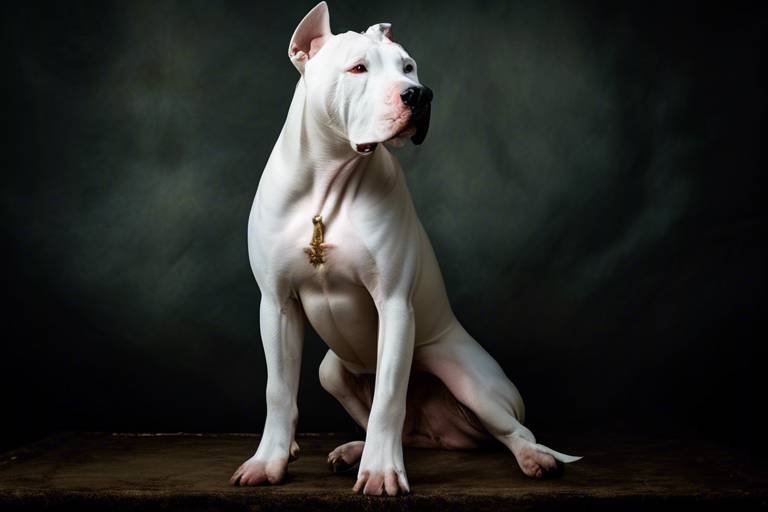Understanding the Characteristics of the French Spaniel
The French Spaniel is a breed that captures the hearts of dog lovers with its unique blend of charm, intelligence, and loyalty. This article dives deep into the distinctive traits that make this breed stand out, from its friendly temperament to its appealing physical features. If you're considering adding a French Spaniel to your family, or simply want to learn more about this fascinating breed, you're in for a treat!
One of the most striking qualities of the French Spaniel is its adaptability. These dogs are not just hunting companions; they thrive in various environments, from bustling family homes to serene countryside settings. Their friendly nature makes them excellent companions for children and adults alike. Imagine a dog that can seamlessly transition from a lively game of fetch in the backyard to a cozy evening on the couch. That's the French Spaniel for you!
But what exactly sets them apart? The French Spaniel is known for its intelligent and eager-to-please demeanor. This breed is not just about looks; they have a personality that shines through in every interaction. Their ability to connect with humans is profound, often displaying a level of empathy that can be surprising. Whether you're having a bad day or simply need a cuddle buddy, a French Spaniel is always ready to lend a paw.
In terms of physical characteristics, the French Spaniel boasts a well-proportioned, athletic build that reflects its heritage as a hunting dog. With a strong frame and a graceful gait, they are both functional and beautiful. Their coats are another highlight, typically featuring a medium-length, silky texture that can come in various colors, including white, orange, and brown. This unique combination of traits not only makes them visually appealing but also enhances their suitability as active companions.
As we explore the characteristics of the French Spaniel, it's essential to note that they require regular exercise and mental stimulation to stay happy and healthy. This breed thrives on activity, whether it's a long walk, a game of fetch, or even agility training. Engaging their minds is just as important as physical exercise, so consider incorporating puzzle toys or training sessions into your routine.
In summary, the French Spaniel is a breed that embodies a perfect blend of affection, intelligence, and elegance. Their adaptability and eagerness to please make them ideal family pets, while their striking appearance adds to their allure. If you're looking for a companion that will not only join you on outdoor adventures but also provide endless love and loyalty, the French Spaniel might just be the perfect match for you.
- Are French Spaniels good with children? Yes, they are known for their friendly and gentle nature, making them excellent companions for kids.
- How much exercise do French Spaniels need? They require regular exercise, ideally at least an hour a day, to keep them happy and healthy.
- Are they easy to train? Yes, French Spaniels are intelligent and eager to please, which makes training relatively straightforward.
- What is their grooming needs? Their medium-length coat requires regular brushing to prevent matting and to keep it looking its best.

Origin and History
The French Spaniel is a breed with a fascinating and rich history that dates back several centuries, intertwining with the culture and traditions of France. Originating in the 16th century, these dogs were primarily bred for hunting purposes, particularly for flushing game birds out of dense underbrush. Their lineage can be traced back to the Spaniels that were used by French nobility, who valued their keen sense of smell and ability to work alongside hunters.
Over the years, the French Spaniel has been recognized for its versatility in various hunting environments, showcasing its adaptability and intelligence. As hunting practices evolved, so did the role of the French Spaniel, transitioning from a mere hunting companion to a beloved family pet. This evolution reflects a broader trend in dog breeding, where the focus has shifted from solely utilitarian purposes to companionship and family integration.
In the 19th century, the breed began to gain formal recognition, leading to the establishment of breed standards that define what a French Spaniel should look like and how it should behave. The breed was officially recognized by the French Kennel Club in 1908, further solidifying its status as a distinct breed. The French Spaniel quickly became popular not only in France but also in various parts of Europe and beyond, thanks to its friendly demeanor and strong work ethic.
Throughout its history, the French Spaniel has been celebrated for its loyalty and companionship. These dogs have been known to form strong bonds with their families, making them excellent companions for both individuals and children. Their gentle nature and playful spirit contribute to their appeal as family pets, and they have often been described as having a child-like enthusiasm that endears them to everyone they meet.
Today, the French Spaniel continues to thrive as both a hunting dog and a family companion. Many enthusiasts appreciate the breed's combination of athleticism and affectionate personality, making it a popular choice for those seeking an active yet loving pet. As we explore the unique traits of the French Spaniel, it becomes clear that their history is not just a tale of hunting prowess but also one of companionship and love.

Physical Characteristics
The French Spaniel is a breed that captivates dog lovers with its unique and appealing physical traits. These dogs are not just pretty faces; they possess a combination of characteristics that make them stand out in the canine world. From their size to their coat, every aspect contributes to their charm and functionality as a hunting companion and family pet. Understanding these physical traits is crucial for potential owners, as it helps in assessing whether this breed is a suitable match for their lifestyle.
When it comes to size, the French Spaniel is a medium-sized breed, typically weighing between 35 to 50 pounds (16 to 23 kg). Their height ranges from 20 to 24 inches (51 to 61 cm) at the shoulder. This size makes them agile and versatile, able to navigate various terrains while hunting or playing. However, it’s essential to note that individual dogs may vary in size due to genetics and upbringing. Understanding the dimensions of the French Spaniel is crucial for potential owners, as it can influence space requirements and exercise needs.
The coat of the French Spaniel is one of its most distinctive features, often described as medium-length and water-resistant. This breed typically has a wavy or slightly curly coat that helps to keep them comfortable in different weather conditions. The coat can come in a variety of colors, including:
- White and orange
- White and black
- White and chestnut
- Tricolor combinations
These color variations not only add to their aesthetic appeal but also reflect their lineage and breeding history. Regular grooming is essential to maintain the health of their coat, as it can accumulate dirt and debris during outdoor activities.
Beyond their size and coat, French Spaniels possess unique facial and body features that enhance their overall charm. They have a well-defined muzzle that is neither too long nor too short, giving them a balanced appearance. Their ears are long, floppy, and set low, which adds to their expressive demeanor. Additionally, their eyes are large and soulful, often conveying a sense of intelligence and friendliness. These features not only make them endearing but also functional for their role as hunting dogs, as they rely on their keen senses for tracking and retrieving.
In summary, the French Spaniel is a breed that combines beauty with practicality. Their size, coat, and distinctive features make them a wonderful choice for families and individuals alike. Whether you’re looking for a loyal companion or an active hunting partner, understanding these physical characteristics will help you appreciate the unique allure of the French Spaniel.
Q: What is the lifespan of a French Spaniel?
A: The average lifespan of a French Spaniel is around 12 to 14 years, depending on genetics and care.
Q: Do French Spaniels require a lot of exercise?
A: Yes, they are active dogs that require daily exercise to stay healthy and happy.
Q: Are French Spaniels good with children?
A: Absolutely! French Spaniels are known for their friendly and gentle temperament, making them great family pets.
Q: How often should I groom my French Spaniel?
A: Regular grooming every few weeks is recommended to keep their coat healthy and free of mats.
Size and Weight
When considering bringing a French Spaniel into your home, understanding its is crucial. This breed typically stands between 20 to 24 inches tall at the shoulder, making them a medium-sized dog. Their weight usually ranges from 35 to 60 pounds, depending on factors like age, sex, and overall health. It’s fascinating how such a range can exist within a single breed, but this variability adds to their charm.
One of the most appealing aspects of the French Spaniel is its well-proportioned body, which is both elegant and athletic. Their build allows for agility and grace, making them excellent companions for outdoor activities. Whether you’re taking them for a brisk walk or engaging in a game of fetch, their size makes them adaptable to various living situations, from apartments to larger homes.
To give you a clearer picture, here’s a simple table that outlines the average size and weight of the French Spaniel:
| Characteristic | Male | Female |
|---|---|---|
| Height | 20-24 inches | 19-23 inches |
| Weight | 50-60 pounds | 35-50 pounds |
As you can see, there is a slight difference in size between males and females, with males generally being larger and heavier. This distinction can help potential owners prepare for the specific needs of their future pet. Remember, however, that each dog is unique, and factors such as diet, exercise, and genetics can influence their final size and weight.
Additionally, it's important to note that maintaining a healthy weight is essential for the overall well-being of your French Spaniel. Obesity can lead to a range of health issues, so regular exercise and a balanced diet are key. A routine that includes both physical activity and mental stimulation will not only keep them fit but also promote a happy and engaging life.
In summary, understanding the size and weight of the French Spaniel is more than just numbers; it’s about ensuring that you can provide the right environment and care for your furry friend. Their medium stature makes them a versatile choice for many families, and with the right attention, they can thrive as beloved companions.
- What is the average lifespan of a French Spaniel? The average lifespan is around 12 to 14 years.
- Do French Spaniels shed a lot? They have a moderate shedding level, so regular grooming is recommended.
- Are French Spaniels good with children? Yes, they are known for their friendly and gentle temperament, making them great family pets.
Coat and Color
The coat of the French Spaniel is not just a simple covering; it’s a defining feature that adds to the breed's overall charm and appeal. These dogs typically sport a medium-length, wavy coat that feels soft to the touch, making them not only visually appealing but also pleasant to cuddle with. The texture of their fur is often described as silky, which is a delight for anyone who enjoys petting their furry friend. One of the most fascinating aspects of the French Spaniel's coat is its ability to provide protection against various weather conditions, showcasing the breed's adaptability.
When it comes to color variations, the French Spaniel is quite versatile. Their coats can be found in a range of colors, which can include:
- White and Orange
- White and Black
- White and Brown
- Tricolor (a combination of white, orange, and black)
Each color combination has its own unique appeal, and many potential owners find themselves drawn to the specific hues and patterns that these dogs display. For instance, the white and orange combination is particularly striking, as it gives off a warm and inviting feel, while the tricolor option showcases a more adventurous spirit with its bold contrasts.
Aside from the colors, the French Spaniel's coat also features distinctive markings that can vary from dog to dog. These markings can include spots, patches, or even flecks of color that add to their individuality. It's almost like each dog is wearing a unique coat of armor, making them stand out in a crowd. Regular grooming is essential to maintain their coat's health and beauty. Brushing a couple of times a week not only helps to remove loose hair but also keeps their coat shiny and vibrant.
In summary, the coat and color of the French Spaniel are vital components of their identity. The blend of their silky texture and a variety of color combinations makes them not only a joy to own but also a true standout in the canine world. Whether you're looking for a playful companion or a loyal protector, the French Spaniel's coat is just one of the many reasons to consider welcoming this breed into your home.
- How often should I groom my French Spaniel?
It's recommended to brush your French Spaniel at least twice a week to keep their coat healthy and free of tangles.
- What colors are common in French Spaniels?
Common colors include white and orange, white and black, white and brown, and tricolor.
- Do French Spaniels shed a lot?
They do shed, but regular grooming can help manage the amount of loose hair around your home.
- Are French Spaniels hypoallergenic?
No, French Spaniels are not considered hypoallergenic, so they may not be suitable for allergy sufferers.
Distinctive Features
The French Spaniel is not just another dog breed; it is a delightful blend of elegance and utility. One of its most striking features is the facial expression, which often exudes a friendly yet dignified demeanor. Their eyes are large and expressive, typically dark in color, which adds to their charm and gives them a keen, intelligent look. These eyes seem to communicate a sense of curiosity and warmth, making them incredibly appealing to dog lovers.
Another distinctive aspect of the French Spaniel is its ears. They are long and droopy, hanging close to the head. This feature not only adds to their adorable appearance but also serves a functional purpose, as it helps to funnel scents towards their sensitive noses, enhancing their hunting abilities. Speaking of noses, the French Spaniel has a well-defined, broad muzzle that complements its overall facial structure, giving it a robust and sturdy appearance.
When it comes to their body structure, French Spaniels are known for their athletic build. They possess a strong, muscular frame that is both agile and powerful, allowing them to excel in various activities, from hunting to agility competitions. Their tails are also noteworthy; typically set high and carried in a lively manner, they add to the breed's playful and energetic personality. The tail is often long and feathery, which not only enhances their aesthetic appeal but also serves as a tool for communication, expressing their mood and excitement.
In terms of size, French Spaniels are medium-sized dogs, generally weighing between 35 to 50 pounds. Their height typically ranges from 20 to 24 inches at the shoulder. This size makes them versatile, suitable for both apartment living and country homes, as they do not require excessive space but still enjoy outdoor activities. Their proportions are well-balanced, contributing to their overall gracefulness.
Lastly, the coat of the French Spaniel deserves special mention. While we will delve deeper into this in the following sections, it’s important to note that their coat is usually medium-length, wavy, and dense, providing protection from various weather conditions. The coat can come in a variety of colors, including white, orange, brown, and black, often with unique patterns that make each dog truly one-of-a-kind. This unique coloration, combined with their distinctive physical traits, makes the French Spaniel a breed that stands out in any crowd.
In summary, the French Spaniel is a breed characterized by its , which include a friendly expression, long droopy ears, a robust body structure, and a beautiful coat. These traits not only enhance their aesthetic appeal but also contribute to their functionality as hunting companions and loyal family pets.
- What is the lifespan of a French Spaniel? The average lifespan of a French Spaniel is around 12 to 14 years, depending on their health and living conditions.
- Are French Spaniels good with children? Yes, French Spaniels are known for their friendly and gentle temperament, making them excellent companions for children.
- Do French Spaniels require a lot of exercise? Yes, they are an active breed that requires regular exercise to stay healthy and happy. Daily walks and playtime are essential.
- How do I groom a French Spaniel? Regular brushing is necessary to manage their coat and prevent matting. Bathing should be done as needed, usually every few months.
Temperament and Behavior
The French Spaniel is renowned for its friendly and adaptable nature, making it a fantastic choice for families and individuals alike. With a temperament that can be described as both gentle and affectionate, these dogs thrive on companionship and are known to form strong bonds with their owners. Imagine a loyal friend who greets you with a wagging tail and a joyful bark every time you walk through the door; that’s the essence of a French Spaniel. They are not just pets; they become integral members of the family, often participating in various family activities and outings.
One of the standout traits of the French Spaniel is its playfulness. They possess an innate curiosity and love for play, which can lead to hours of entertainment for both the dog and its owners. Their playful nature is often matched by their intelligence, making training a rewarding experience. However, it’s essential to remember that with their intelligence comes a need for mental stimulation. Without proper engagement, they can become bored and may exhibit undesirable behaviors. Therefore, incorporating games and interactive toys into their daily routine is crucial to keep their minds sharp.
Moreover, French Spaniels are known for their sociable demeanor. They generally get along well with children, other dogs, and even pets of different species. This adaptability makes them an ideal choice for households with multiple pets or young children. They have a natural instinct to be part of a pack, which can lead to a harmonious household if properly socialized. Early exposure to various environments, people, and experiences is vital in shaping their behavior and ensuring they grow into well-rounded adults.
In terms of behavior, French Spaniels are often described as calm yet energetic. They enjoy their playtime but also appreciate moments of relaxation with their owners. This balance makes them excellent companions for those who enjoy an active lifestyle but also value downtime at home. Their friendly disposition often attracts attention from strangers, and they typically respond well to new faces, although some may exhibit a bit of shyness initially. This shyness can be mitigated through proper socialization, allowing them to become confident and secure in various situations.
To summarize the temperament and behavior of the French Spaniel, here’s a quick overview:
| Characteristic | Description |
|---|---|
| Affectionate | Forms strong bonds with family members and enjoys human companionship. |
| Playful | Loves to engage in games and requires mental stimulation. |
| Sociable | Gets along well with children and other pets. |
| Calm yet Energetic | Enjoys playtime but also values relaxation and downtime. |
In conclusion, the French Spaniel’s temperament and behavior make it a delightful breed for various lifestyles. Their adaptability and loving nature ensure that they not only fit into a family dynamic but also enhance it, creating a joyful atmosphere filled with love and companionship.
- What is the average lifespan of a French Spaniel? The average lifespan is around 12 to 14 years.
- Are French Spaniels good with children? Yes, they are known for their friendly and gentle nature, making them great companions for kids.
- How much exercise do French Spaniels need? They require regular exercise, ideally an hour a day, to keep them healthy and happy.
- Are they easy to train? Yes, French Spaniels are intelligent and eager to please, which makes training relatively straightforward.

Training and Socialization
Training and socialization are crucial components in raising a well-adjusted French Spaniel. These dogs are not only intelligent but also eager to please, making them relatively easy to train when approached with the right techniques. Imagine having a furry companion that not only listens to you but also thrives on your praise and attention! This breed responds best to positive reinforcement, so rewarding them with treats or affection when they succeed is key. Consistency is vital; using the same commands and cues will help your French Spaniel understand what you expect from them.
Socialization should begin at an early age, ideally when your pup is around 8 weeks old. This is the perfect time to introduce them to a variety of experiences, including different environments, people, and other animals. Think of socialization as a buffet of experiences for your dog; the more diverse the menu, the better prepared they will be to handle the world around them. Taking your French Spaniel to parks, pet stores, or even dog-friendly cafes can help them become more comfortable in various settings. Remember, a well-socialized dog is often a happier and more confident one!
When it comes to obedience training, establishing a strong bond with your French Spaniel is essential. This bond is built through trust and mutual respect, which can be achieved by spending quality time together during training sessions. Start with basic commands such as "sit," "stay," and "come." These foundational commands not only provide structure but also enhance safety for your pet. As your dog masters these commands, you can gradually introduce more complex tricks and tasks. The joy of seeing your French Spaniel perform a trick you've taught them is incredibly rewarding!
It’s also important to note that socialization is not a one-time event but a continuous process. Regularly exposing your dog to new situations will help reinforce their confidence and adaptability. For instance, consider enrolling your French Spaniel in a puppy class or a dog training group. These classes can provide a controlled environment for socialization while also teaching essential skills. Additionally, interacting with other dogs can help your French Spaniel develop proper canine etiquette, which is crucial for their overall behavior.
In summary, training and socialization are not just tasks to tick off a list; they are ongoing journeys that enhance the relationship between you and your French Spaniel. With patience, consistency, and plenty of love, you will cultivate a well-behaved, sociable, and happy dog that fits seamlessly into your family life.
- How long does it take to train a French Spaniel? Training duration varies by dog, but with consistent practice, basic commands can often be learned within a few weeks.
- What is the best age to start socialization? Ideally, start socializing your French Spaniel as early as 8 weeks old to ensure they grow into a well-adjusted adult.
- Are French Spaniels easy to train? Yes, they are generally eager to please and respond well to positive reinforcement methods.
- How often should I train my French Spaniel? Short, frequent training sessions (about 5-10 minutes) are more effective than long, infrequent ones.
Obedience Training
When it comes to training your French Spaniel, is not just a suggestion—it's a necessity! This breed is known for its intelligence and eagerness to please, which makes them relatively easy to train if you approach it the right way. Think of obedience training as the foundation of a house; without a solid base, everything else can crumble. You want to build a strong relationship with your furry friend, and training is the perfect way to do that.
Start with basic commands like sit, stay, and come. These commands are essential for safety and communication. When your French Spaniel understands these basic commands, you’ll find it easier to manage their behavior in various situations. Remember, consistency is key! Use the same words and hand signals each time you train. This consistency helps your dog understand what you expect from them.
Another important aspect of obedience training is positive reinforcement. This technique involves rewarding your dog for good behavior rather than punishing them for mistakes. For instance, when your French Spaniel successfully follows a command, reward them with treats, praise, or even a fun play session. This not only motivates them but also strengthens your bond. Imagine how much more enjoyable training will be when your dog associates it with positive experiences!
Additionally, consider incorporating short training sessions into your daily routine. French Spaniels thrive on mental stimulation, so keep training sessions fun and engaging. Try to keep each session around 5 to 10 minutes long to maintain their attention. You can even turn training into a game! For example, hide treats around the house and have your dog find them using commands. This not only reinforces their training but also keeps them active and entertained.
Lastly, don’t forget about patience. Every dog learns at their own pace, and it’s crucial to remain patient throughout the process. If your French Spaniel struggles with a command, take a step back and try again later. Remember, training is a journey, not a race. Embrace the little victories along the way!
- How long does it take to train a French Spaniel? Training can vary from dog to dog, but with consistent practice, you can expect to see progress within a few weeks.
- What is the best age to start obedience training? It's best to start training your French Spaniel as a puppy, around 8 weeks old, but older dogs can still be trained successfully.
- Can I train my French Spaniel on my own? Absolutely! While professional training classes can be beneficial, many owners successfully train their dogs at home using online resources and books.
Socialization Techniques
Socializing your French Spaniel is a fundamental aspect of ensuring they grow up to be well-adjusted and confident companions. Just like how humans thrive in diverse environments and social settings, dogs also require exposure to different people, animals, and situations to develop a balanced temperament. Think of socialization as a form of "doggy school," where your pup learns the ropes of interacting with the world around them. The earlier you start this process, the better. Ideally, socialization should begin when your French Spaniel is a puppy, as this is a critical period for development.
One effective technique is to introduce your French Spaniel to a variety of environments. This could include taking them to parks, pet-friendly stores, or even busy streets. The idea is to expose them to different sounds, sights, and smells. For instance, the sound of children playing, the hustle and bustle of a market, or the presence of other dogs can be both exciting and slightly overwhelming for your furry friend. Gradually, as they experience these situations, they'll learn to navigate them with ease. Remember, patience is key! If your pup seems anxious, take a step back and allow them to acclimate at their own pace.
Another fantastic way to socialize your French Spaniel is through playdates with other dogs. This not only helps them learn to interact with their canine peers but also teaches them important social cues. You can organize playdates with friends or family who have dogs, or even consider enrolling your pup in a local puppy kindergarten class. These classes are designed to provide a safe environment for young dogs to meet and mingle, all while under the supervision of experienced trainers. Moreover, this setting allows for structured play and learning opportunities.
In addition to meeting other dogs, exposing your French Spaniel to various people is equally important. Invite friends and family over to meet your pup, and encourage them to engage with your dog in a calm manner. This helps your French Spaniel associate positive experiences with new people. You can also take them to community events where they can encounter a diverse range of individuals, including children, adults, and seniors. The more positive interactions they have, the more comfortable they will feel in different social situations.
Finally, consider using positive reinforcement techniques during socialization. Reward your French Spaniel with treats, praise, or playtime when they exhibit calm and friendly behavior in new situations. This not only reinforces good behavior but also helps build their confidence. Over time, your dog will learn that new experiences are nothing to be afraid of, but rather opportunities to explore and enjoy.
- What is the best age to start socializing my French Spaniel? Ideally, you should start socializing your French Spaniel when they are a puppy, around 8 to 12 weeks old, as this is the critical period for development.
- How can I tell if my dog is well-socialized? A well-socialized dog will typically show curiosity and confidence in new situations, interact positively with other dogs and people, and display calm behavior in various environments.
- What if my French Spaniel is fearful of new experiences? If your dog shows fear, take things slow. Gradually expose them to new experiences and provide plenty of positive reinforcement to build their confidence.
- Are there specific socialization classes for French Spaniels? While there are general puppy classes, you can often find trainers who specialize in specific breeds, including French Spaniels. Look for classes that emphasize positive reinforcement techniques.
Frequently Asked Questions
- What is the temperament of the French Spaniel?
The French Spaniel is known for its friendly and adaptable nature. They are typically affectionate with families and get along well with children and other pets. Their playful demeanor makes them a joy to have around, but they do require social interaction and mental stimulation to thrive.
- How big do French Spaniels get?
French Spaniels are medium-sized dogs, usually weighing between 35 to 50 pounds. They stand about 20 to 24 inches tall at the shoulder. Their size makes them versatile companions, suitable for both active families and those looking for a more laid-back pet.
- What kind of grooming do French Spaniels require?
Grooming a French Spaniel is relatively straightforward. Their medium-length coat requires regular brushing to prevent matting and to keep it looking its best. Typically, a good brush once a week is sufficient, but during shedding seasons, you might want to increase the frequency to keep loose hair in check.
- Are French Spaniels easy to train?
Yes, French Spaniels are intelligent and eager to please, which makes them quite trainable. Consistent obedience training from a young age is essential, as it helps to build a strong bond between you and your dog. Positive reinforcement techniques work best with this breed.
- Do French Spaniels have any health issues?
Like all breeds, French Spaniels can be prone to certain health issues, such as hip dysplasia and ear infections due to their long ears. Regular vet check-ups and a healthy diet can help mitigate these risks and ensure your dog lives a long, happy life.
- How much exercise do French Spaniels need?
French Spaniels are energetic dogs that require regular exercise to stay healthy and happy. Daily walks, playtime, and mental stimulation through games or training sessions are vital. Aim for at least an hour of exercise each day to keep them well-balanced.
- Are French Spaniels good family pets?
Absolutely! French Spaniels are known for their affectionate nature and adaptability, making them excellent family pets. They are gentle with children and enjoy being part of family activities, whether it's going for a walk or just lounging around at home.
- What is the lifespan of a French Spaniel?
On average, French Spaniels live between 12 to 14 years. With proper care, a balanced diet, and regular exercise, many can live into their late teens. It's essential to provide them with a loving environment to enhance their quality of life.



















